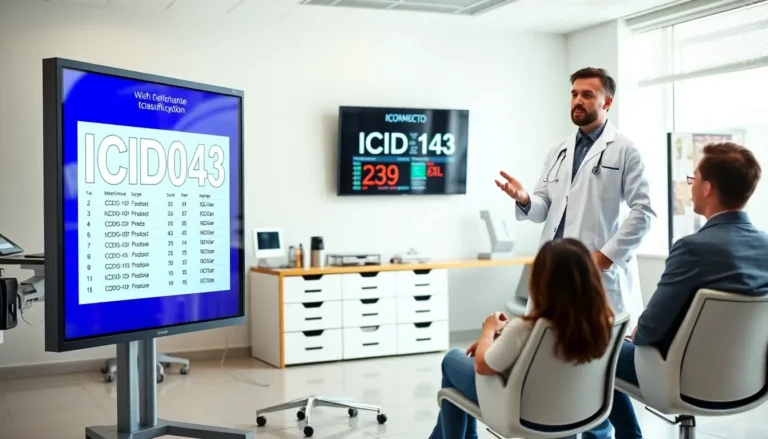Table of Contents
ToggleNavigating the ups and downs of a relationship can feel like trying to assemble IKEA furniture without the instructions—confusing and often frustrating. Whether it’s communication breakdowns or just the daily grind, couples often find themselves in need of a little guidance. That’s where relationship counseling comes in, offering a lifeline when love feels more like a tug-of-war than a dance.
Understanding Relationship Counseling Advice
Relationship counseling serves as a supportive resource for couples facing challenges. It provides guidance to navigate issues that disrupt harmony within the partnership.
What Is Relationship Counseling?
Relationship counseling involves professional support aimed at helping couples resolve conflicts. Therapists often facilitate discussions that promote understanding. Techniques used during sessions focus on improving communication and identifying underlying problems. Counseling may address various aspects of a relationship, including emotional connections, intimacy, and trust.
Benefits of Seeking Counseling
Seeking counseling offers numerous advantages for couples. Improved communication skills result from structured sessions, enabling partners to express feelings effectively. Increased understanding of each other’s perspectives enhances empathy. Counseling provides tools to manage conflicts, reducing the likelihood of recurring arguments. Strengthened emotional bonds often lead to a more fulfilling partnership, nurturing a positive environment for growth.
Common Relationship Issues Addressed

Couples often face various challenges that can affect their connection. Counseling serves as a valuable tool for addressing these issues effectively.
Communication Problems
Communication problems frequently arise, leading to misunderstandings and frustration. Couples may misinterpret each other’s intentions, causing resentment to build. Lack of active listening contributes to emotional distance. Professional counseling helps partners develop clear communication strategies. Techniques such as “I” statements enhance expression without blame. Regular practice of open dialogue fosters emotional intimacy and understanding.
Trust Issues
Trust issues can undermine the foundation of a relationship. Past betrayals or insecurities often create doubt in a partner’s loyalty. Counseling facilitates discussions about fears and vulnerabilities, allowing individuals to share their feelings safely. Establishing transparency builds reassurance between partners. Learning to validate each other’s feelings strengthens trust over time. A counselor can guide couples toward rebuilding confidence, fostering a healthier bond.
Conflict Resolution
Conflict resolution is essential for maintaining a healthy relationship. Disagreements are natural, yet how couples navigate them defines relationship dynamics. Effective counseling introduces conflict resolution techniques. Couples learn to approach disagreements constructively rather than defensively. Identifying underlying issues during sessions helps prevent recurring arguments. Employing negotiation skills promotes compromise and harmony. A focus on collaborative problem-solving enhances partnership resilience.
When to Seek Relationship Counseling
Recognizing when to seek relationship counseling plays a crucial role in maintaining a healthy partnership. Guidance from professionals often helps couples navigate difficult times more effectively.
Signs That Counseling May Be Beneficial
Frequent arguments can signal the need for professional help. Communication breakdowns, where discussions lead to misunderstandings, might indicate deeper issues. Experiencing emotional distance suggests partners may feel disconnected. Trust issues, often stemming from previous betrayals, require attention to restore security. Significant life changes, such as relocation or job loss, may also disrupt relationship dynamics. Each of these signs serves as a clear indicator that counseling could prove beneficial.
Choosing the Right Time for Help
Timing matters in seeking relationship counseling. Early intervention can prevent minor issues from escalating into major conflicts. When partners notice consistent patterns of discontent, addressing them promptly enhances the chances of resolution. Seeking help when both partners express willingness to engage in the process creates a receptive environment. Avoid waiting until resentment fuels further dissatisfaction, as this complicates the journey toward healing. Each couple’s situation is unique; however, deciding to reach out sooner rather than later maximizes the potential for positive outcomes.
Tips for Effective Counseling Sessions
Effective counseling sessions foster growth in relationships. These sessions require commitment and a proactive approach from both partners.
Setting Goals for Counseling
Setting clear, realistic goals enhances the counseling experience. Partners should identify specific areas for improvement, such as communication or intimacy, before attending sessions. Establishing measurable objectives helps track progress. Engaging in discussions with the counselor about these goals creates a shared vision for therapy. It’s beneficial to reassess these goals periodically, adjusting them as needed. Celebrating small milestones keeps motivation high and reinforces commitment to the process.
Being Open and Honest
Honesty is crucial for successful counseling. Partners need to express their thoughts and feelings without fear of judgment. Communicating openly fosters trust, making it easier to tackle sensitive issues. Vulnerability plays a vital role, encouraging both individuals to share their concerns and emotions authentically. Active listening promotes understanding and empathy during these discussions. This openness cultivates a safe environment, which is essential for effective resolution of conflicts. Prioritizing transparency paves the way for deeper connections between partners.
Navigating relationship challenges can feel overwhelming but seeking professional counseling can pave the way for healing and growth. By addressing communication breakdowns trust issues and conflict resolution struggles couples can build stronger emotional connections. The benefits of counseling extend beyond immediate solutions; they foster a deeper understanding and empathy between partners.
Recognizing the right time to seek help is crucial and early intervention can prevent minor issues from escalating. With commitment and a proactive approach couples can maximize their counseling experience. Embracing vulnerability and open dialogue during sessions lays the foundation for lasting change. Ultimately relationship counseling offers couples the tools they need to create a more fulfilling partnership.







